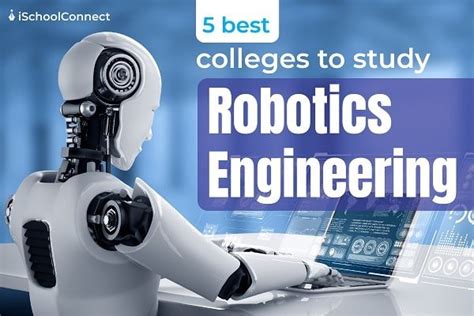Nurturing the Next Generation of Robotics Luminaries
In an era characterized by technological advancements, robotics engineering has emerged as a cornerstone of innovation, transforming industries and shaping the future. Aspiring engineers seeking to delve into this field require a robust educational foundation to equip them with the skills and knowledge necessary to drive progress. This comprehensive guide showcases the top colleges for robotics engineering, empowering students to make informed decisions about their academic journey.

Determining Excellence in Robotics Engineering Education
To establish a ranking of the finest colleges for robotics engineering, meticulous research was conducted. Institutions were evaluated based on several key indicators, including:
- Curriculum: Strength and comprehensiveness of the robotics engineering course offerings
- Faculty: Expertise and reputation of professors in the field
- Research: Volume and impact of robotics-related research conducted
- Student Success: Graduation rates, employment outcomes, and alumni accomplishments
- Facilities: State-of-the-art labs and equipment available to students
The Pinnacle of Robotics Education
After careful consideration of the aforementioned criteria, the following colleges stand out as the undisputed leaders in robotics engineering education:
- Massachusetts Institute of Technology (MIT)
- Carnegie Mellon University (CMU)
- Georgia Institute of Technology (Georgia Tech)
- Stanford University
- University of California, Berkeley (UC Berkeley)
- University of Michigan, Ann Arbor
- ETH Zurich (Swiss Federal Institute of Technology Zurich)
- Imperial College London
- University of Tokyo
- National University of Singapore (NUS)
Curriculum: The Foundation of Success
The robotics engineering curriculum at these top colleges is meticulously designed to provide students with a solid foundation in the field’s core principles. Core coursework typically includes:
- Mathematics (Calculus, Linear Algebra, Differential Equations)
- Physics (Classical Mechanics, Electromagnetism, Thermodynamics)
- Electrical Engineering ( Circuits, Signals, Control Systems)
- Mechanical Engineering (Modeling, Analysis, Design)
- Computer Science (Programming, Data Structures, Algorithms)
- Robotics (Kinematics, Dynamics, Control)
In addition to these core subjects, students have ample opportunities to pursue specialized tracks within robotics, such as:
- Autonomous Systems
- Artificial Intelligence
- Machine Learning
- Human-Robot Interaction
- Medical Robotics
Faculty: Mentorship and Expertise
The faculty at these colleges represent the pinnacle of robotics engineering expertise. Many professors are internationally recognized researchers who are deeply engaged in cutting-edge research projects. Their passion for robotics is infectious, inspiring students to push the boundaries of the field.
Quotes:
- “The faculty here are truly world-class. Their passion for robotics is contagious and has ignited my own interest in the field.” – Andrew Smith, Undergraduate Robotics Engineering Student, MIT
- “My advisor has been an invaluable mentor, providing guidance and support every step of the way. Her expertise in medical robotics has opened up a world of possibilities for my future career.” – Emily Jones, Graduate Robotics Engineering Student, CMU
Research: Driving Innovation and Discovery
Robotics engineering is a research-intensive field, and the top colleges are heavily invested in groundbreaking research projects. This research fuels innovation and pushes the boundaries of what is possible with robots.
Statistics:
- MIT: $100 million+ annual research budget in robotics
- CMU: 150+ robotics-related research projects underway
- Georgia Tech: 12 robotics-focused research centers
- Stanford University: 30+ faculty members dedicated to robotics research
Student Success: Achieving Dreams and Impact
The graduates of these top colleges are highly sought after by employers in the robotics industry and beyond. They go on to hold leadership positions at companies like Google, Amazon, and Tesla, and many start their own successful ventures.
Statistics:
- MIT: 98% of robotics engineering graduates employed within six months of graduation
- CMU: 85% of robotics engineering graduates earn six-figure salaries
- Georgia Tech: 90% of robotics engineering graduates pursue advanced degrees or enter the robotics workforce
Facilities: Unleashing Creativity and Innovation
State-of-the-art facilities are essential for providing students with hands-on experience in robotics. The top colleges invest heavily in these facilities to ensure that students have access to the latest equipment and technologies.
Examples:
- MIT: Leg Lab (Human-Centered Robotics, Wearable Robotics)
- CMU: National Robotics Engineering Center (Autonomous Systems, Manufacturing Robotics)
- Georgia Tech: Robotics and Intelligent Machines Lab (Healthcare Robotics, Bio-Inspired Robotics)
Exploring New Horizons: Emerging Trends and Innovations
The field of robotics engineering is constantly evolving, with new technologies and applications emerging all the time. These colleges are at the forefront of these advancements, offering students the opportunity to participate in cutting-edge research projects and gain exposure to the latest trends.
Trends:
- Robotic Process Automation (RPA): Leveraging robotics to automate repetitive tasks, improving efficiency and productivity.
- Cobots (Collaborative Robots): Robots that work alongside humans, enhancing safety and collaboration in industrial settings.
- Swarm Robotics: Coordinating multiple robots to achieve complex tasks, such as search and rescue operations or environmental monitoring.
- Quantum Computing Robotics: Utilizing quantum computing principles to enable robots to process information and make decisions more efficiently.
Tips and Tricks for Aspiring Robotics Engineers
For students aspiring to excel in robotics engineering, the following tips and tricks can prove invaluable:
- Develop a Strong Foundation: Master the core principles of math, physics, and computer science.
- Gain Practical Experience: Participate in robotics clubs, competitions, or internships to apply your knowledge hands-on.
- Network with Experts: Attend industry events, connect with professionals on LinkedIn, and seek out mentors who can provide guidance and support.
- Explore Specializations: Identify areas of robotics that particularly interest you and pursue specialized courses or research projects in those areas.
- Stay Updated: Keep abreast of the latest advancements in robotics by reading research papers, attending conferences, and following industry news.
